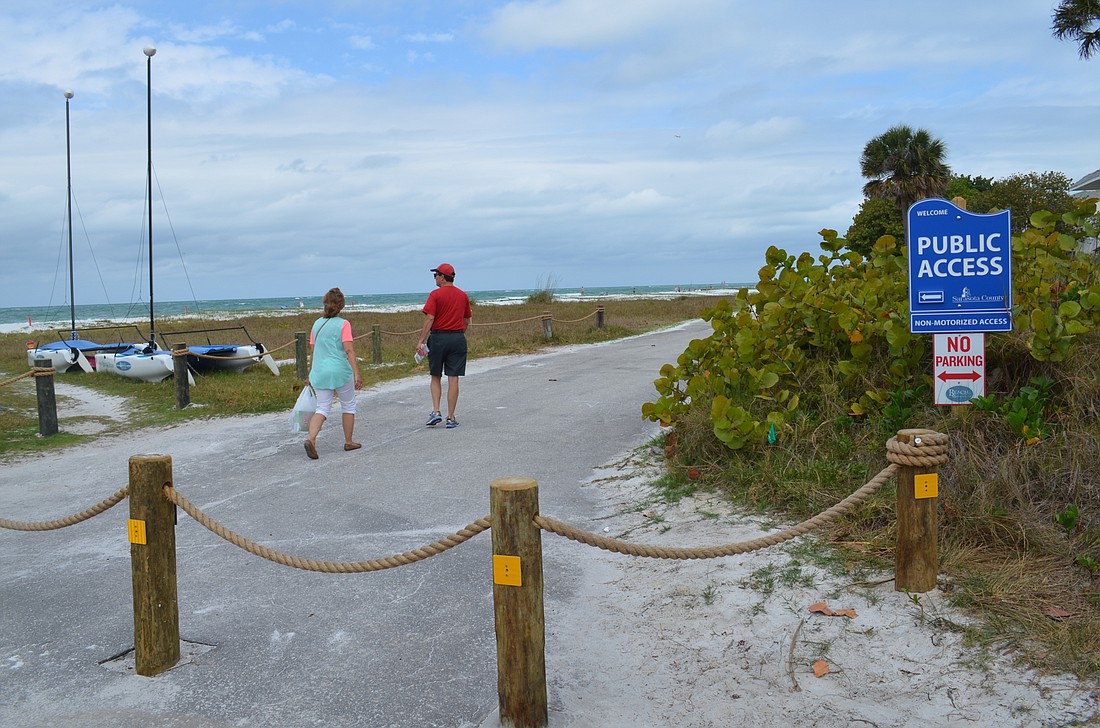- February 11, 2026
-
-
Loading

Loading

When you talk to Mike Cosentino about the county’s 2016 decision to relinquish control of a segment of Beach Road near Columbus Boulevard on Siesta Key, his confidence regarding the facts of the case is quickly apparent.
That confidence led to his decision to launch the Reopen Beach Road campaign, which strives to reverse the street closure. It has remained unshaken through what might, to others, appear to be setbacks in his case to return the road to public ownership and reopen it to vehicular traffic.
In April 2017, a judge dismissed the central argument in a lawsuit Cosentino filed against the county contesting the decision, stating Cosentino did not have standing to bring the case. Last month, Cosentino lost a primary election for a seat on the County Commission, a race he felt motivated to enter after the initial Beach Road decision.
And, on Aug. 29, County Attorney Stephen DeMarsh detailed a series of questions regarding the legality of two charter amendment proposals Cosentino successfully campaigned to get on the November ballot.
“After an election, if they were to pass, there may be legal challenges brought by private parties or even the county,” DeMarsh said.
Still, headed into November’s election, Cosentino remains steadfast in his beliefs regarding Beach Road. He believes the County Commission violated its own comprehensive plan when it voted 4-1 to permanently vacate a 350-foot segment of Beach Road that had been closed to through traffic since 1993. He believes an agreement between the county and nearby private property owners establishing pedestrian access across the former road segment is insufficient for guaranteed public use of the land.
And, although he thinks opposing forces are conspiring against him, he believes his campaign will ultimately prevail.
“We know that, in spite of the fact Mr. DeMarsh might find these things confusing, they’re in fact not confusing at all — because the people of Sarasota are going to pass them by an overwhelming margin,” Cosentino said.
Cosentino has some reason to be optimistic about the public support for the proposed charter amendments.
Reopen Beach Road had to gather more than 14,700 signatures from registered voters to get two referendums onto the ballot. One question will ask voters whether the county should reacquire Beach Road and reopen it to vehicular traffic. A second would ask voters if the commission should be prohibited “from vacating any road segments or rights of way abutting any beach, river, creek, canal, lake, bay, gulf access or waterfront vista.”
Although a segment of the community may be enthusiastic about the prospect of restoring county ownership of Beach Road, lawyers involved in the ongoing dispute are already raising potential issues with the charter amendments. In a memo, the county outlined seven points of concern regarding the legality of Reopen Beach Road’s proposals.
The memo raises concerns about restricting the commission's decision-making ability without exception and the vagueness of the language in the charter amendments. DeMarsh said that a mandate to reacquire a specific piece of property could lead to budgetary issues for the commission, depending on the terms proposed by the private property owners.
“I guess it’s possible an agreement could be reached with them whereby they would convey that interest back to Sarasota, but if for some reason they refused to do so or placed such a high cost on that, then the County Commission would be in a very difficult position,” DeMarsh said.
Attorneys for the neighboring private property owners have also criticized Cosentino’s proposals. Bill Moore, representing Sheila and William Caflisch, said he believed the proposed charter amendment was illegal and suggested the county would need to pay millions to reacquire the road.
Charlie Bailey, the lawyer for the Maddens, said the entire Reopen Beach Road campaign was misleading. He emphasized that a public easement allowed continued pedestrian access where the roadway once was, though Reopen Beach Road supporters have said the access point has not been maintained in a way that would ensure accessibility for individuals with mobility impairments or cyclists.
“I’ve seen signs around Sarasota County saying we need to keep Beach Road public, which is inaccurate and deceptive, because it is and always has been and always will be public,” Bailey said.
Opponents of Reopen Beach Road aren’t the only ones with legal questions, though. Cosentino accused the county of writing the ballot questions in such a way that it would invite legal challenges. Cosentino and Reopen Beach Road attorney Elizabeth Gomez-Mayo suggested the county did not have the authority to change the group’s proposed ballot language, although DeMarsh dismissed that claim at the Aug. 29 meeting.
As the referendum nears, Cosentino continues to fight his initial legal battle against the county. A portion of the 2016 lawsuit is ongoing in the 12th Judicial Circuit. Cosentino complained about how the county attorney’s office and judge are handling the case, but he remains confident he will prevail here, too, even if it requires an appeal.
Cosentino originally envisioned the referendum as shortcut around what has been a lengthy legal dispute, an opportunity for citizens to clearly communicate their thoughts on the best way to handle the future of Beach Road.
“We said, you know what? Our commissioners aren’t willing to follow the law,” Cosentino said. “The judge doesn’t understand the law. So what we need to do is we need to create a charter amendment so the people can decide.”
With both sides staking out a legal foothold, though, it appears November’s election may fail to bring closure to the battle over Beach Road — no matter what the voters decide.